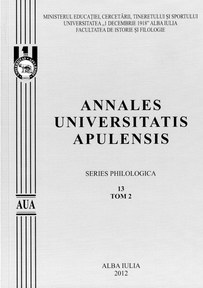Optimizarea componentei moral-civice a activităţilor de lectură în învăţământul special – rolul metodologiei didactice activizante
The Optimization of the Moral-Civic Component of the Reading Activities in Special Education – The Role of the Activising Didactic Methodology
Author(s): Cosmina Florea, Georgeta OrianSubject(s): Cultural Essay, Political Essay, Societal Essay
Published by: Universitatea »1 Decembrie 1918« Alba Iulia
Keywords: special education; moral-civic education; reading; activising methodology
Summary/Abstract: The main purpose of moral education consists in the formation of the individual as a moral subject who thinks and acts according to the standard of social ethics, of ideals and values and rules which it comprises. The moral profile of the individual represents an important value standard of the human collectivity. Moral education is not possible outside the social relations that are established between people. The structure of the moral profile represents a set of representations and moral knowledge, moral feelings, moral customs, traits of will and character. Of all the aspects of personality formation, the one regarding the moral and civic attitude has a central place because the entire behaviour of the individual relies on this attitude and is an indicator of his/her agreement with the moral and judicial norms of the community in which the person lives. The moral and judicial values are transmitted since childhood and they are the ones to shape the moral character and the personality of an individual. Among the components of education, the moral-civic one has a special place due to the role it has in the affirmation and integration in society and due to its complexity and specificity. The moral and the civic behaviour rely on each other and are interdependent because they require both obeying the legislation, the traditions and the values of a society and the main rules and moral values of a society. A major preoccupation for educators is the knowledge of moral development of the children and the influence they can have upon it. The child gets to know the awareness of moral duty through the example of his/her educator. Collective mentality and the system of education specific for the contemporary society can play a fundamental role in the fulfillment of moral education. The formation of moral conscience amongst pupils is an extremely important aspect which can help them distinguish between right and wrong, truth and lie, justice and injustice. These notions have special meanings in special education. Our paper aims at illustrating a series of modern methodological approaches (obviously combined with the classical ones) which can facilitate the understanding of some contents, the assimilation of knowledge, the moral development of the child’s personality, the elaboration and stabilization of his/her moral profile. With this regard, the referential titles in the literature of speciality, both from special psycho-pedagogy and methodology. Our paper relies on an obvious reality: in special education, the moral-civic formation is fulfilled in and through all the subjects of study and the contribution of all educators.
Journal: Annales Universitatis Apulensis. Series Philologica
- Issue Year: 13/2012
- Issue No: 4
- Page Range: 325-323
- Page Count: 9
- Language: Romanian

